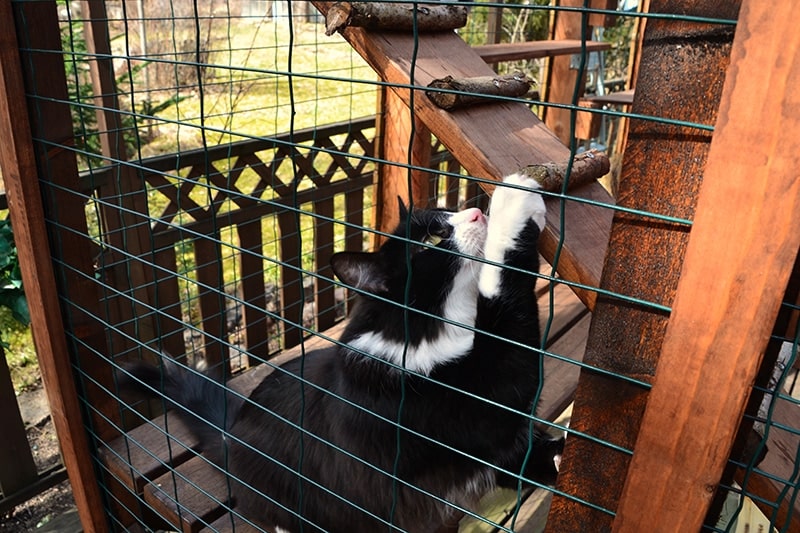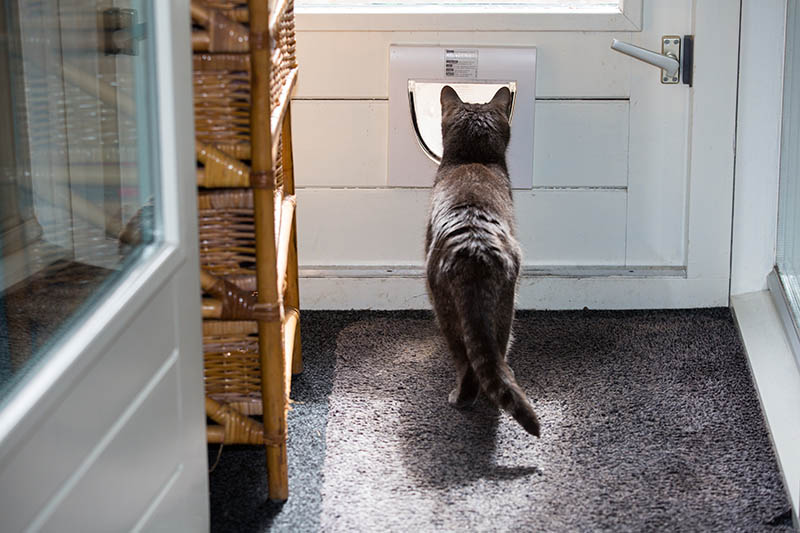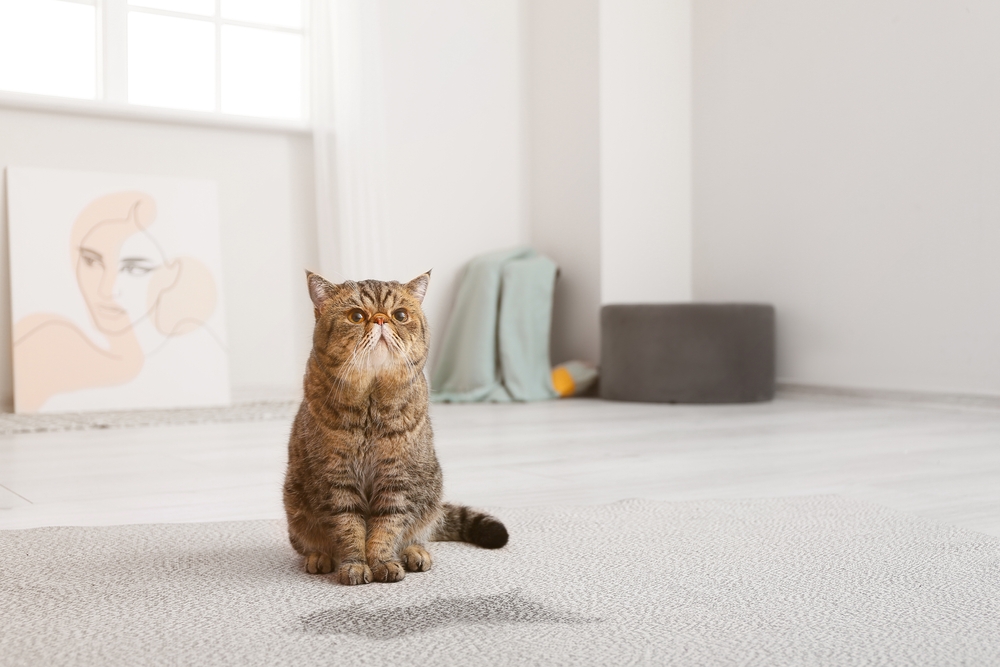Click to Skip Ahead
One of the challenges that many cat owners face is keeping their cats indoors. Cats can be very curious about what’s beyond the door, but it can be very unsafe for them to wander outside on their own.
If you live with a cat that’s a master escape artist, it’s important to come up with a plan to prevent them from running outside. Here are a few things to keep your cat safe and reduce the chances of them bolting out the door.
The 5 Ways on How to Keep Cats from Going Outside
1. Use Positive Reinforcement
Cats are extremely observant and are fairly quick to figure out how they can get rewarded with a treat. So, if your cat tends to dash towards the door whenever it opens, you can try to deter them by rewarding them for running away from the door when it opens.
You can train your cat to run to a different designated spot every time the door opens. This usually requires two people, as one person has to open the door while another calls the cat to a different location and rewards them. With some time and consistency with training, your cat will build a positive association with the door opening and retreating to a different location.

2. Post Cat Signs Outside Your Door
A quick thing you can do to reduce the risk of your cat running out the door is to put a sign near your door to let guests know you have a cat in the house. You can add instructions to your sign, such as requesting visitors to wait an extra moment for you to open your door.
Also, make sure to place the sign in a noticeable spot and use colors that stand out. This will help people to read it more quickly and ensure they follow the instructions.
3. Invest in a Catio
If you have a curious and adventurous cat, you may want to look into setting up a catio for them. Catios enable cats to experience the outdoors while keeping them in a safe, enclosed space. Catios come in all shapes and sizes, and you can make it a really fun space for your cat by adding toys and cat furniture to it.
Adding playtime in a catio to your cat’s daily routine can help alleviate boredom and promote healthy exercise. This can reduce the risk of your cat bolting out the door.

4. Create a Barrier in Front of the Door
It can be helpful to put a gate in the hallway or place another barrier in front of the door. While most cats can clear baby gates and other types of obstructions, these barriers can slow them down and give you more time to close the door before your cat escapes. You can also install a security chain on your door so that the door only opens slightly and leaves a space that’s too narrow for your cat to escape through.
5. Consider Spaying or Neutering Your Cat
Cats that haven’t been spayed or neutered are more likely to roam. They can be more territorial and try to expand their territory borders, and they may try to escape to find a mate. So, if your cat hasn’t been spayed or neutered, they may have a stronger urge to dash out the door.
Most veterinarians and animal welfare organizations recommend spaying and neutering cats, as it may lower health risks and help control the stray cat population. It’s best to consult with a veterinarian to determine the safest way to implement this procedure.

If you need to speak with a vet but can’t get to one, head over to PangoVet. It’s an online service where you can talk to a vet online and get the personalized advice you need for your pet — all at an affordable price!
Reasons Why Cats May Try to Go Outside
Cats can try to run out the door for a variety of reasons. They can be quite curious and want to see what’s on the other side. Sometimes, something enticing, like a decorative plant or bird feeder, might spark their interest. Cats that don’t get enough mental stimulation or exercise may also be prone to escaping due to having pent-up energy or being bored.
Observing your cat’s behavior can help immensely with understanding why your cat wants to go outside. Once you figure out what’s triggering this behavior, you can develop a plan to prevent your cat from dashing out the door.
Conclusion
If your cat has a tendency to want to bolt out the door, it’s important to figure out how to keep them safe by preventing them from escaping. One of the best ways to keep your cat from escaping is to understand what’s causing your cat to want to go outside. Finding out the reason that’s causing your cat to run out can point you in the right direction and develop an effective plan that will keep them safe indoors.
Featured Image Credit: DextairPhotography, Shutterstock











So far, (as in the last twenty years), I have lost three cats I simply adored, each of them because they ran outside and did not return forthwith. No amount of calling them or looking for them ever worked. Every day it was necessary to gird myself to the fact that if and when my cat dashes out the door it will be for the last time.
There's only one door to the whole house. There's no mud room, There's no vestibule: Nothing to prevent an escape, and my cats are faster than I am, and so, I must now resign myself to never having another cat buddy, no matter how seriously they are needed to provide companionship and spiritual comfort.
I live in rural east Kentucky, bordered by a thick "jungle" on three sides, so dense and unnavigable I never set foot over my yard line, into the midst. There are all sorts of critters. Cats, dogs, coyotes, skunks, possum, black bears, owls, buzzards, red-tail hawks, weasels, racoons, and a wide range of stinging and poisonous insects. I know my kitties could not resist the call of the wild and ended up as someone's dinner.
Hey Hal, sorry to hear about all of the kitty troubles you have had over the years. There are some cats that just do not want to be indoors, and it sounds like you got 3/3. There are certain breeds that are more well known for being indoor cats (though individual cats still vary). If you do decide to get a cat again, I'd recommend rescuing one that is already well-known for being happy and relaxed indoors – some cats don't ever want to leave their safety net of inside, they sound like the perfect cats for you. Best wishes.